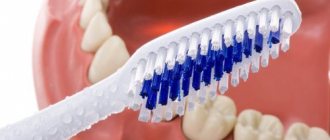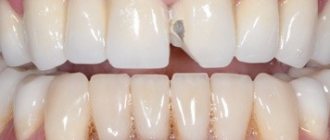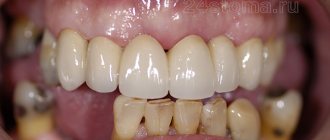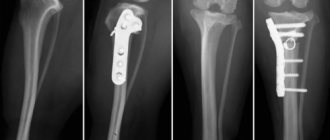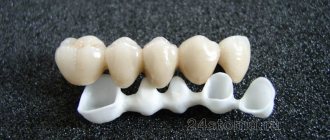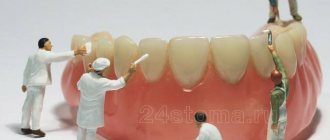Today, metal-ceramics is considered one of the most popular materials for prosthetics in dentistry. Its main advantages are high strength and durability, decent aesthetics and affordable cost. However, in order for prosthetics to be truly durable and reliable, the patient should know how to properly care for metal-ceramic teeth and carry out such care regularly.
Crown care
Artificial teeth are not prone to decay and are not susceptible to carious damage. However, if there is no care for teeth with crowns, plaque forms on the surface and an unpleasant odor appears. These factors contribute to the formation of tartar, which, in turn, provokes serious dental problems.
Caring for ceramic crowns is simple; usually the whole procedure comes down to daily preventative cleaning of teeth and installed structures. It is not necessary to go to a dental clinic for this.
Do I need to take care of artificial teeth?
Of course, these are not real teeth and caries cannot develop on them. But do not forget that crowns are either attached to natural teeth or are firmly adjacent to them. That is, the restored tooth is a full-fledged participant in the dentition and the entire dentofacial apparatus and affects all its elements. Plaque can form on the surface of the crowns, causing not only an unpleasant odor, but also gum disease. Hygiene flaws inevitably lead to a number of problems:
- Secondary caries under the crown.
- Inflammatory processes of soft tissues, the appearance of gum pockets.
- Damage to adjacent teeth due to plaque accumulation.
- Deterioration of the body's condition due to constant exposure to bacteria accumulated on the teeth.
How to care for crowns
If we consider the situation as a whole, proper care of crowns is no different from the prevention of all dental diseases. However, professionals recommend following the following rules:
- Hygienic cleaning of teeth and installed structures twice a day. To do this, it is better to use pastes with a minimum abrasiveness coefficient so as not to damage the enamel and soft tissues.
- Carefully remove food debris from the interdental space. An irrigator copes with this task perfectly.
- Rinse your mouth after every meal. To do this, you can use special compounds or just warm water.
- Watch your diet. If crowns are installed, it is better to avoid eating nuts, crackers, etc.
- Control food temperature. Too hot tea or ice-cold lemonade can cause cracking of the relatively fragile cermets.
Dentists recommend massage for crown care. Such structures create increased pressure on the gums, so it is important to stimulate blood circulation in the soft tissues. The massage is performed with smooth, circular movements along and counterclockwise.
Rules of conduct after installing crowns
There are several rules that you can follow to keep your mouth healthy:
- Brush your teeth twice a day – immediately after waking up and before going to bed.
- Rinse your mouth if possible after every meal. This will get rid of food debris and slow down plaque formation.
- Thoroughly clean areas where plaque and food may accumulate. We are talking about the space under the hinged crown of the bridge. To do this, you can use an irrigator, brushes and other devices.
- You should avoid eating too hard foods and chewing on non-food items. Nail chewing, nuts, candy chewing – all of these should be avoided to maximize the life of your crowns.
- You should reduce your consumption of coffee, black tea, red wine, and other coloring foods.
- Gum care is also a very important attribute of healthy teeth. Rinsing and careful attention to the condition of soft tissues are required.
- Cleaning your tongue is a very useful activity. Plaque also accumulates here and must be removed.
Careful care will help maintain health and maximize the service life of any restorations.
Seeing a doctor
You need to make an appointment with a dentist if the following problems occur:
- The installed structure has lost stability;
- There is an unpleasant odor from the mouth;
- An inflammatory process is observed on the gums, pain is felt;
- The crown is installed incorrectly, causes discomfort to the person, and interferes with other teeth;
- The prosthesis fell out.
In addition, you need to visit the clinic for professional preventive cleaning and crown replacement. The service life of such structures varies between 2-15 years, depending on the material of manufacture and compliance with operating rules. Even if the service life of the crown has not expired, it is better to replace it if the color changes or cracks appear. Do not self-medicate, it is better to consult a specialist!
Rejection of bad habits
Smoking negatively affects the health of our body, but primarily affects our teeth. As a result, artificial crowns gradually begin to accumulate plaque and change their shade. A similar reaction is caused by excessive consumption of coffee, tea and drinks containing dyes, so you should monitor not only oral hygiene, but also daily habits, especially for those who like to use their teeth for other purposes (opening bottles, chewing off hard objects, etc.). d.).
The benefits of an irrigator when caring for zirconium crowns
The irrigator is ideal for caring for zirconium crowns and dental structures. The operating principle of the irrigator is based on a directed pulse of water with adjustable intensity. Such equipment massages the gums and effectively cleans the interdental space. Unlike dental floss, it is impossible to damage soft tissues with an irrigator; there is absolutely no discomfort during such treatment.
You can purchase the irrigator in a stationary or portable version. The second option is slightly inferior in terms of water capacity, but you can take the device with you and care for your oral cavity while traveling.
Author of the article
Nutritional Features
Too cold or hot food damages tooth enamel, especially if consumed at the same time (for example: hot tea and cold jam). Metal-ceramic dental crowns are also susceptible to heat and can crack, break, or suffer a variety of other damages that require immediate replacement. You should not indulge in solid foods, for example: nuts, candies, etc.
Our teeth, whether natural or artificial, are in dire need of daily and competent care. Do not forget to follow the recommendations of your doctor, and also monitor the health of your teeth: have your teeth treated under anesthesia and do not let oral diseases ruin your life. Modern dentistry in Minsk offers treatment without fear and pain, or more precisely, treatment in your sleep. Specialists at the Family Dentistry Center use drug sedation for these purposes. While the patient is sleeping peacefully, the doctor can carry out all the necessary procedures without causing discomfort or pain. It is convenient and safe for both adult patients and children.
With proper care, high-quality cermet dentures can last more than 15 years. This is not only profitable from a financial point of view, but also practical. Monitor the health of your teeth and promptly seek help or advice from your doctor. Remember, the health and beauty of your smile depends only on you!
Toothpaste for orthopedic structures
What is the best way to clean dental bridges? Many patients use children's pastes or tooth powders. But the former cannot always cope with plaque on the crowns, and the latter scratch the ceramic lining of artificial teeth. Therefore, it is better to use specialized products - they are suitable both for cleaning fixed prostheses (crowns, bridges, veneers) and for those who wear braces. Let's look at the most popular pastes:
- ROCS PRO Brackets & Ortho: special proteolytic components and granules in the composition help break down plaque on bridges and teeth, even in hard-to-reach areas. Does not contain fluoride (which can be harmful if swallowed), but instead contains safe and bioavailable remineralizing ingredients that strengthen enamel,
- PresiDENT Profi Ortho Braces: contains xylitol and natural ingredients - aloe and licorice root extracts, pineapple, papain. They contribute to thorough and gentle removal of plaque, long-term preservation of freshness,
- Dentaid Vitis Orthodontic: contains antibacterial ingredients and plant extracts, reduces the risk of inflammation and remineralizes enamel,
- Pierrot Orthodontic Natural Freshness: prevents the development of caries due to phosphates and plant extracts, also slows down the formation of plaque on teeth and crowns,
- Dental Pro Ortho&Brackets: with antibacterial effect, hyaluronic acid for gum restoration,
- Corega 2 in 1: does not contain abrasive particles, has a mint taste, and the fluoride content at a dosage of 1450 ppm helps strengthen your own teeth,
- “Professor Persin” for sensitive teeth: contains sodium fluoride, xylitol, aloe extract, therefore it simultaneously protects against caries and plaque formation, moisturizes the mucous membranes, and prevents the formation of foci of infection.
Read on the topic: what kind of toothpaste should be for dentures, and which one to choose.
Metal-ceramic dentures
Metal-ceramic dentures are dental crowns consisting of a metal frame and a ceramic coating. This design looks quite natural and lasts a long time, so metal-ceramic crowns are installed both in place of one missing tooth and several teeth in the dentition (in this case we are talking about a bridge made of metal-ceramics). The metal-ceramic frame of the future crown is made from alloys of nickel and chromium, cobalt and chromium, a base of palladium and silver, gold or platinum. The latter components rarely fit into the pricing policy for metal-ceramic crowns, which stably maintains the demand for this type of dental crown, so the decision to install a metal-ceramic crown is still supported taking into account inexpensive manufacturing materials, which ensure the low cost of metal-ceramic dentures.
What to do if there is a smell under the crown
Herbal rinses or applications are not able to stop the process of destruction of dental tissue. Moreover, the use of folk remedies can delay a visit to the doctor, delaying time. And now a small caries provokes a lot of inflammation. If in the initial stages the tooth can be cured, then in advanced cases it has to be removed. And even if it is possible to save it, the treatment can be lengthy and expensive.
Sometimes, pus under the crown accumulates in periodontal pockets. The gum peels off from the neck of the tooth, bacteria enter the gap, forming, together with decay products and minerals, first plaque and then tartar. Without professional pocket cleaning (curettage), it is easy to lose a tooth. Suppuration of the gum pockets is possible even if the crown is installed on the implant. Most often, if the technology was broken or the implant was selected incorrectly.
It is impossible to make a diagnosis on your own. The dentist relies not only on the examination data, but also on the x-ray. It clearly shows carious lesions or inflammatory processes. The treatment and prognosis for saving the tooth depend on the diagnosis.
What to do
The process of decay of the dental element under the prosthesis is not reversible. The development of pathology is indicated by the appearance of symptoms:
- stench from under the crown;
- food getting under the prosthetic structure;
- carious lesion of the root at the bottom of the prosthesis;
- darkening of the sealed unit.
If these signs appear, you should immediately go for a consultation to a dental clinic. The dentist is able to identify carious lesions even on surfaces that are difficult to inspect.
If caries has developed in the interdental space, a targeted photograph of the tooth will be required. On an x-ray, caries damage appears as intense darkening, which is uncharacteristic of healthy elements. Timely seeking dental care allows you to cure the unit and replace the prosthetic product with a new one. In the absence of proper treatment, there is a risk of losing a dental element.
In some cases, the appearance of a symptom may be due to suppuration of periodontal pockets. The pathology manifests itself as redness of the gums around the prosthesis or the discharge of pus. If such a disease occurs, do not postpone an in-person examination with a doctor.
Special dental floss
To care for bridges, only threads labeled “super floss” are used and only if the dentist has given permission. How to clean bridges with floss? In “superflosses,” the thread is rigid on one edge; it is on this side that the thread is inserted between the outer crown of the bridge and the natural tooth. Then the thread is pulled to its soft thickened part, which is used for cleansing with gentle movements. Then the floss, again with the hard side, can be additionally inserted into the subprosthetic space (a small gap between the gum and the “empty” crowns of the bridge, if any) and passed with the soft “middle” to the opposite supporting tooth. Pull the superfloss out from under the prosthesis, holding it by the hard edge.
What types of dentures are there and what are they made of?
Today, the types of dentures, as well as the materials from which they are made, are varied. If the patient is missing one tooth and its root has not been preserved, then it would be best to install an implant and a dental crown on it. If several teeth are missing in the oral cavity, the situation will be saved by installing a bridge (possibly also on implants as the most reliable design). In the case of complete edentia, we will talk about restoring teeth using a complete denture, be it a fixed denture on implants or a complete removable denture.
We should not forget that the material from which dental crowns are made is no less diverse than the structures on which these crowns are fixed. In this case, the beauty and strength of the crown part of the tooth will depend on the material .
Considering the high degree of desired aesthetics, we can safely say that metal dental crowns are hopelessly outdated, just like crowns made of precious metals (white beautiful teeth have long replaced shiny gold teeth). The leading positions are occupied by zirconium dioxide crowns and all-ceramic dental crowns (metal-free ceramic crowns). But along with them, thanks to decent aesthetics and reasonable prices, metal-ceramic crowns remain quite in demand, which we will talk about in more detail.
When can metal ceramics be installed?
Metal-ceramic dental crowns will be an excellent alternative to other dentures in the case of the absence of one tooth in any part of the dentition, although, given the availability today of more aesthetic dentures, metal-ceramics are preferred to be installed in the chewing area of the upper or lower jaws. Dental crowns made of metal-ceramics are often used to restore several lost teeth in a row - this design is called a “metal-ceramic bridge.” Typically, a metal-ceramic bridge replaces up to four missing teeth.
